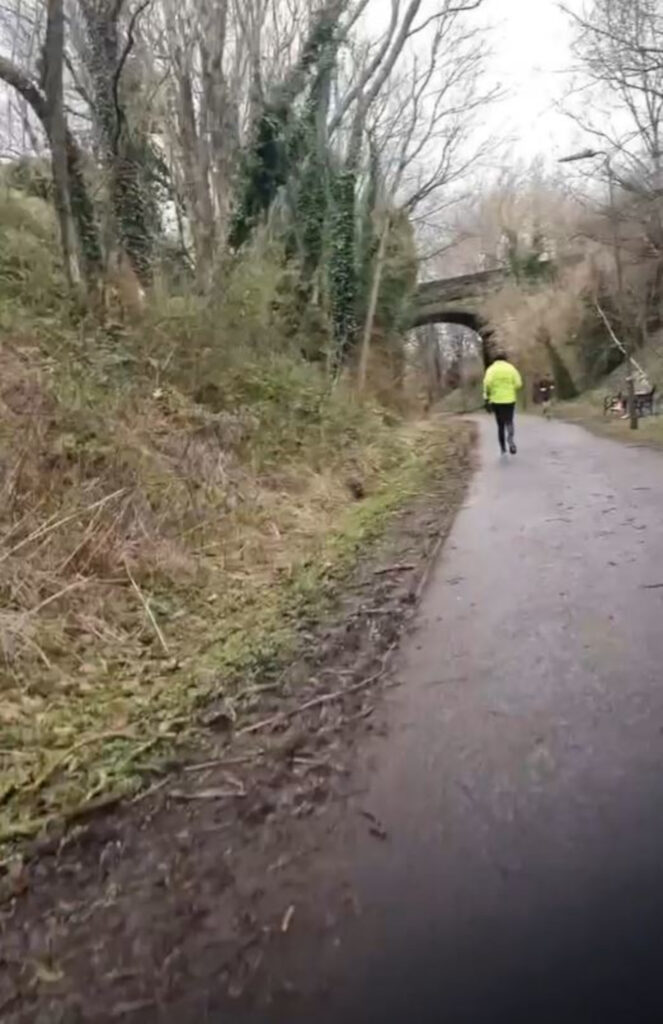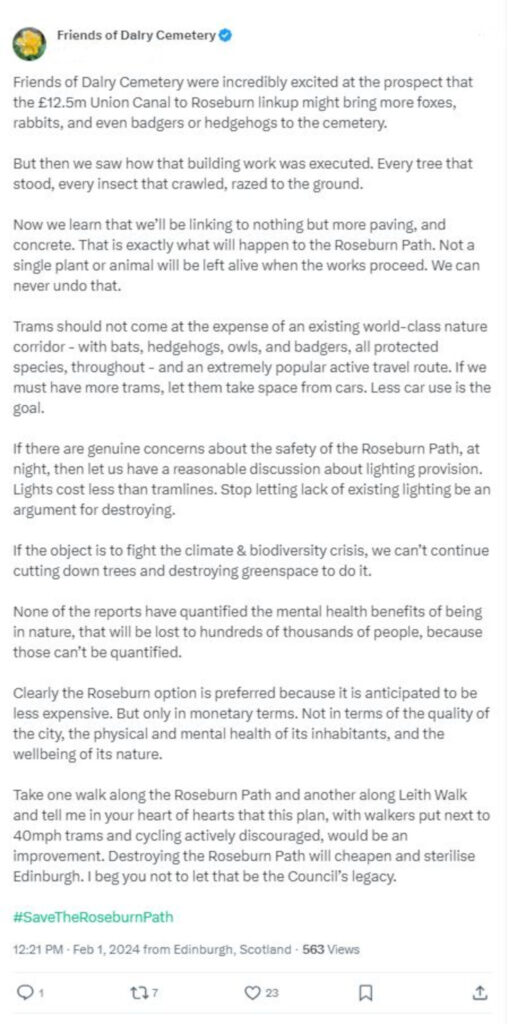THE City of Edinburgh council has come under fire with claims that their plans for a new tramline will “sterilise” the city.
Community group Friends of Dalry Cemetery aired their concerns on Friday that plans to renovate the Roseburn Path in the west of the capital would leave “not a single plant or animal” alive.

Their grievances come amid work on the £12.5m Roseburn to Union Canal project that the group say has resulted in trees and animals being “razed to the ground”.
The group are now pleading for a conversation to be opened over how best to transform the city without its green spaces suffering.
The Friends of Dalry Cemetery wrote in a post last Friday: “Friends of Dalry Cemetery were incredibly excited at the prospect that the £12.5m Union Canal to Roseburn linkup might bring more foxes, rabbits, and even badgers or hedgehogs to the cemetery.
“We saw how that building work was executed. Every tree that stood, every insect that crawled, razed to the ground.
“Now we learn that we’ll be linking to nothing but more paving, and concrete. That is exactly what will happen to the Roseburn Path.
“Not a single plant or animal will be left alive when the works proceed. We can never undo that.
“Trams should not come at the expense of an existing world-class nature corridor – with bats, hedgehogs, owls, and badgers, all protected species, throughout – and an extremely popular active travel route.
“If we must have more trams, let them take space from cars. Less car use is the goal.
“If there are genuine concerns about the safety of the Roseburn Path at night, then let us have a reasonable discussion about lighting provision.
“Lights cost less than tramlines. Stop letting lack of existing lighting be an argument for destroying.
“If the object is to fight the climate and biodiversity crisis, we can’t continue cutting down trees and destroying greenspace to do it.
“None of the reports have quantified the mental health benefits of being in nature that will be lost to hundreds of thousands of people, because those can’t be quantified.
“Clearly, the Roseburn option is preferred because it is anticipated to be less expensive but only in monetary terms.

“Not in terms of the quality of the city, the physical and mental health of its inhabitants, and the wellbeing of its nature.
“Take one walk along the Roseburn Path and another along Leith Walk and tell me in your heart of hearts that this plan, with walkers put next to 40mph trams and cycling actively discouraged, would be an improvement.
“Destroying the Roseburn Path will cheapen and sterilise Edinburgh. I beg you not to let that be the Council’s legacy.”
They added a final message directed towards Edinburgh Labour councillor Scott Arthur, writing: “Whatever the arguments for and against, this will be your legacy.”
The post received hundreds of likes and dozens of comments from concerned locals who flocked to support the group’s views.
One person wrote: “I remember being at one of the many ‘save Meadowbank’ meetings just before the financial crash.
“We had a few councillors and one MSP that turned up that night – it was like talking to a brick wall, all they wanted was to sell the land to developers – wouldn’t round to see the results of a vote by the minions.
“They are intent on destroying our beautiful city, taking away our green spaces, leisure facilities, and roads, all for student houses and soulless flats that don’t stand the test of time.”
Another said: “Well said. It’s a linear park.”
A third commented: “That’s disappointing to know that they do so much damage while doing the work.
“There are also colonies of spotted wood butterflies that have spread along the [Water of Leith] path and Roseburn path.”
A fourth added: “Disgraceful that all these trees were pulled down and the wildlife that was lost for such a small section of cycleway.”
Speaking today, Jakob Assarsson said on behalf of Friends of Dalry Cemetery: “It’s important to understand that all of the wildlife will be completely removed.
“They won’t work around any of it or leave a single piece of it intact. That is not how these works go.
“They’re clearly intending to use the full width of the path, and even then, they’ve admitted there probably won’t be enough space for cyclists.
“Plus, they don’t want trees anywhere near tramlines. So, they will rip out every single shred of green because that’s what’s cheap and that’s what’s easy.
“It’s exactly what they did for the £12.5m Union Canal to Roseburn connection.”
Councillor Scott Arthur, Transport and Environment Convener said: “Tram lines to Granton and the BioQuarter would provide reliable, affordable and clean transport between the north and south of the city, not only supporting local regeneration but boosting economic growth and linking to medical, educational and cultural sites along the route.
“This is a transformative project. In developing the Strategic Business Case for the project, officers have spent a great deal of time analysing and modelling the potential routes.
“They weighed up a range of factors, including cost, carbon requirements, ecology, impacts on residents and businesses, and how the resulting route would affect tram journey times and reliability.
“As we progress to public consultation to help inform the Strategic Business Case, it’s essential that we get this part of the process right.
“This is why we will be presenting both options for the line between Granton and the City Centre – via Orchard Brae and via the Roseburn Path – objectively and clearly.
“We’ll also be investigating whether or not high quality cycling can be provided along a tram line on the Roseburn path.
“Once the consultation is complete results will be brought back to committee and any next steps would be subject to further, significant public consultation and stakeholder engagement as part of the development of an Outline Business Case.
“We want to take the people of Edinburgh with us as we progress this major scheme. I am continually being told that Edinburgh must be bolder and act faster in the face of the climate emergency.
“This tramline is a chance to show Edinburgh is serious. Waiting for climate solutions which come with no compromise is not an option.”
